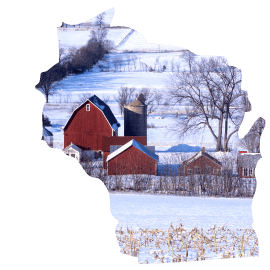Secondary Teacher Preparation in Science:
Wisconsin
Delivering Well Prepared Teachers Policy
Analysis of Wisconsin's policies
Wisconsin offers a broad-field science license for secondary teachers. To qualify, candidates must complete a science program major or a major in physical science (combo of physics and chemistry), earth and space science, or life and environmental science (a combo of biology and environmental studies). The science program must include competencies in each of these subcategories with a concentration in at least one. Regardless of science license (broad field, biology, chemistry, earth and space science, life and environmental science, physics or physical science), the state only requires candidates to pass the Praxis II "General Science" content assessment. Teachers with this license are not limited to teaching general science but rather can teach any of the topical areas.
Although the state's secondary license applies to children ages 10-21, Wisconsin also offers a "middle childhood through early adolescence level (MC-EA)" license for middle school science teachers, which is the equivalent of a generalist 1-8 license. These candidates are required to complete a minor in a content-related area and pass the Praxis II "Middle School" content test, which combines all subject areas.
Recommendations for Wisconsin
Require secondary science teachers to pass tests of content knowledge for each science discipline they intend to teach.
States that allow general science certifications—and only require a general knowledge science exam—are not ensuring that these secondary teachers possess adequate subject-specific content knowledge. Wisconsin's required general assessment combines subject areas (e.g., biology, chemistry, physics) and does not report separate scores for each subject area. Therefore, candidates could answer many—perhaps all—chemistry questions, for example, incorrectly, yet still be licensed to teach chemistry to high school students.
State response to our analysis
Wisconsin asserted that in December 2010, new rule revisions went into effect allowing professional educators to add licenses in a related subject area by demonstrating content knowledge through a test. The state superintendent has selected subject-specific tests for each of these licenses, and information on the new exams will be available as soon as passing scores are set. Wisconsin anticipated posting this information in September 2011.
Wisconsin also pointed out that it is a member of the Council of Chief State School Officers' State Collaborative on Assessment and Student Standards (SCASS) for science and will provide review and feedback of the next generation of science standards. The state anticipates following the same model for reviewing, adopting and implementing when these standards are available: "This will set into motion a review of our educator preparation program content guidelines and our content testing requirements for science licenses."
Last word
According to both the state's website and ETS, the testing requirements outlined in the analysis are still in effect.
Select another topic
Delivering Well Prepared Teachers
- Admission into Preparation Programs
- Elementary Teacher Preparation
- Elementary Teacher Preparation in Reading Instruction
- Elementary Teacher Preparation in Mathematics
- Middle School Teacher Preparation
- Secondary Teacher Preparation
- Secondary Teacher Preparation in Science
- Secondary Teacher Preparation in Social Studies
- Special Education Teacher Preparation
- Assessing Professional Knowledge
- Student Teaching
- Teacher Preparation Program Accountability
Expanding the Pool of Teachers
Identifying Effective Teachers
- State Data Systems
- Evaluation of Effectiveness
- Frequency of Evaluations
- Tenure
- Licensure Advancement
- Equitable Distribution

